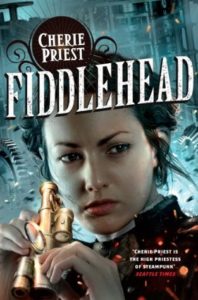Isn’t it great when the last in a set of books is the best of the bunch? Not only is Fiddlehead, the fifth of Cherie Priest‘s Clockwork Century novels, easily the best of the series, it’s terrific fun from start to finish, a page-turner in the best sense of the word. It races from tension-filled opening to satisfying conclusion with barely a pause. I tore through the book, constantly wanting to know what happened next.
In the world of the Clockwork Century, the American Civil War is still running in late 1879. Texas is its own republic, and a source of advanced technology such as diesel motors and zeppelins. The Pacific Northwest is still largely unorganized. Seattle was decimated by a strange gas that turns people into zombies. The city has been sealed off behind an encircling wall, but because a distilled form of the gas is an exciting drug, Seattle has not been abandoned completely. Unfortunately, taking the drug eventually turns people into zombies too, as Union, Texas, and Confederacy are all finding out from the effects on former soldiers trying to ease their pain, and on various forms of thrill-seekers.
By the way, Abraham Lincoln survived John Wilkes Booth’s assassination attempt and served out the remainder of his term. He was succeeded by Ulysses S. Grant. As Fiddlehead opens, Grant is nearing the end of his third term, somewhat worse for the wear, and definitely worse for the drink. Lincoln is a respected elder and mostly keeps to his estate not far from Washington. Priest advances technology enough to provide Lincoln an electric and motorized wheelchair; it’s a prototype, but gives Lincoln some mobility to go with his one remaining good eye.
Lincoln’s chair isn’t the only bit of technology to have arrived early in Priest’s alternate history. A free man of color, Dr Gideon Bardsley, has invented and supervised the construction of the world’s first electromechanical computer. In the book’s first chapter, he has given Fiddlehead, the parameters of both the war effort and the zombie problem, and the calculating engine has returned some alarming results. Without an armistice inside of a year, and the combined efforts of North and South focusing on overcoming the zombie menace, the growing army of the dead will overwhelm the cities of the living. More immediately alarming to Bardsley is that at the critical moment of readout, two men break into the Jefferson Science Building that houses the Fiddlehead and attempt to shoot him. Bardsley barely escapes, but the men do considerable damage to the building with dynamite. With the precious printout in his hands, Bardsley makes his way as quickly and quietly as he can to the estate of his patron, Abraham Lincoln.
Meanwhile, Grant’s Secretary of State is trying to convince him that using a weapon of unprecedented power against the Confederates will end the war once and for all, with Union victory. The Secretary is so assured of his position, and Grant’s weakness or drunkenness, that he has taken considerable steps toward implementing the project before telling Grant anything about it. Readers of the whole series may put two and two together faster than the characters and conclude that, although it sounds like an atomic bomb, the weapon in question is a bomb that will release the zombie gas. Secretary Fowler either does not know or does not care that if used as planned, the bomb will vastly increase the army of walking dead, endangering the Union rather than saving it, even in the unlikely event the Confederates are cowed enough to surrender.
Priest tells much of the story from the perspective of Maria “Belle” Boyd, a former Confederate spy who has been recruited by the Chicago office of the Pinkerton Detective Agency. Charged with investigating the attack on Bardsley, Boyd travels to Washington where she quickly learns that there’s much more afoot than someone trying to stop inconvenient science.
The rest unrolls from there, as dangers multiply and time grows short. A brief mission to a renowned hospital on the Confederate side of the lines puts much more information — notes compiled by characters in previous Clockwork Century book — about the walking dead into Boyd’s hands, information that it’s vital to get back to Bardsley and Lincoln. Those two, meantime, are working on the best way to convince the public and their leaders of the urgency of uniting against the zombies. But powerful people don’t want that truth to get out, and they will use any methods to hand. Grant is no less in danger; a figurehead president might be the most expendable kind of all. Most frightening of all, the bomb is already on its way to its target, with orders outside of the regular change of command, meaning there might not be any way to recall it.
Fiddlehead is even more of a nailbiter, full of twists and turns that pull the characters together but put them in ever greater peril. The situation is never quite hopeless, but even Lincoln’s belief in positive outcomes is sorely tested.
Priest has assembled a terrific cast, blending historical characters — Mr and Mrs Lincoln, Mr and Mrs Grant, a guest appearance by Allan Pinkerton — with people native to the Clockwork Century — the genius Gideon Bardsley, Maria Boyd, US Marshall Henry Epperson, villainous mastermind Katherine Haymes, secret agent Kirby Troost and numerous others. She shows people trying to work past the prejudices of their age, and how difficult that is even for people of goodwill. She also shows how people in inferior positions can take advantage of expectations to gain the upper hand, however temporarily. She shows Grant boozily asea in political maneuvering, and working to redeem himself when the fray in the capital suddenly changes. Fiddlehead is by no means a character study, but it is full of vivid people. They also happen to be in grave danger throughout most of the book.
Such fun!

